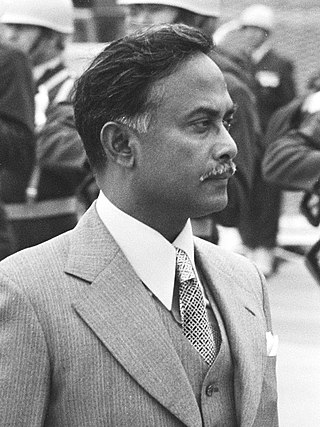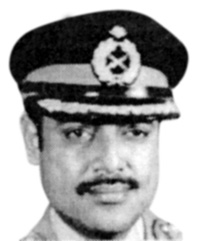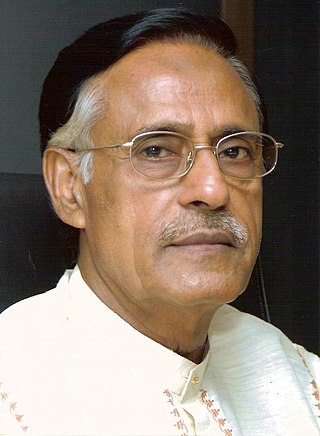
Ziaur RahmanBU HJ HOR was a Bangladeshi military officer and politician who served as the sixth President of Bangladesh from 1977 until his assassination in 1981. One of the leading figures of country's independence war, he broadcast the Bangladeshi declaration of independence in March 1971 from Chittagong. He was the founder of Bangladesh Nationalist Party (BNP). He previously served as the third chief of army staff from 1975 to 1978 with a minor break.
Bir Uttom is the second highest award for individual gallantry in Bangladesh after the Bir Sreshtho and the highest gallantry award for a living individual.
Lt. Col. Abu Taher BU was a Bangladeshi military officer and war hero. He first served in the Pakistan Army, and later defected to the Bangladesh Army during the Bangladesh Liberation War. He crossed into India around early August and reported to the Indian authorities. After a week screening at Dehradun, India, Taher reported to Kolkata, Bangladesh Provincial government at 8 Theatre Rd. He was ordered to report to Sector 11 of Mukti Bahini under command of Major Ziaur Rahman, he became the sector commander after him. He served in BDF from end of August to 2 November 1971. He was awarded the medal Bir Uttom for his gallantry in the liberation war. He was released from military service by Indian military medical board in Pune, India after his leg was amputated. After independence, he was inducted into the Bangladesh Army for administrative retirement with legacy rank of lieutenant colonel. After settling in with family, the government of Bangladesh appointed him with employment at Kumilla. Later Taher turned into a political activist and leader of the left-wing Jatiyo Samajtantrik Dal.

Mohammad Ataul Gani Osmani was a Bangladeshi military officer and revolutionary. His military career spanned three decades, beginning with his service in the British Indian Army in 1939. He fought in the Burma Campaign during World War II, and after the partition of India in 1947, he joined the Pakistan Army and served in the East Bengal Regiment, retiring as a colonel in 1967. Osmani joined the Provisional Government of Bangladesh in 1971 as the commander-in-chief of the nascent Bangladesh Forces. Regarded as the founder of the Bangladesh Armed Forces, Osmani retired as the first full general from the Bangladesh Army in 1972.

Khaled Mosharraf BU was a Major General in Bangladeshi army who is known for his role in the Bangladesh Liberation War and the subsequent coups in post-independence Bangladesh. After deposing Khondakar Mustaq Ahmad in the 3 November 1975 coup, Mosharraf was assassinated on 7 November 1975.

Armed Forces Day is annually observed in Bangladesh on 21 November, signifying formation of Bangladesh Armed Forces on the day in 1971, when the members of the Bangladesh Army, Navy and Air Force were officially unified under and launched joint operations against the Pakistan Armed Forces in the Bangladesh Liberation War. On 16 December 1971, the Pakistani Army of 93,000 surrendered to the joint forces of Bangladesh and India, ending the 9-month long Liberation War of Bangladesh.

Ziaur Rahman, the sixth president of Bangladesh, was assassinated by a faction of officers of Bangladesh Army, on 30 May 1981, in the southeastern port city of Chittagong. Rahman went to Chittagong to arbitrate in a clash between the local leaders of his political party, the Bangladesh Nationalist Party (BNP). On the night of 30 May, a group of officers commandeered the Chittagong Circuit House, a government residence where Rahman was staying, shooting him and several others.
Muhammed Abul ManzurBU was a Bangladeshi military officer who commanded the Bangladesh Forces operations in Sector 8 during the Bangladesh Liberation War against Pakistan in 1971. He was allegedly involved in the assassination of the then-president of Bangladesh, Ziaur Rahman.

Operation Jackpot was a codename for three operations undertaken by the Mukti Bahini in former East Pakistan against the Federation of Pakistan at the climax of the Bangladesh Liberation War.

Colonel Oli Ahmad is a Bangladeshi politician. He is a former minister and a member of Jatiya Sangsad. He is a former Bangladesh Army officer. He is a former Bangladesh Nationalist Party politician and currently president of the Liberal Democratic Party of Bangladesh.
Hasan Mashhud Chowdhury was a Bangladesh Army general who was 11th Chief of Army Staff of the Bangladesh Army from 16 June 2002 to 15 June 2005. He was the last officer to serve in this position who had first been commissioned by and served with the Pakistani Army, before the Liberation War of 1971. He served for two years before the war.

Air Vice Marshal (Retd.) Abdul Karim Khandker, Bir Uttom is a former planning minister of the Government of Bangladesh. He is a retired diplomat and was the Deputy Chief of Staff of the Bangladesh Armed Forces during the Bangladesh Liberation War, He was also the first Chief of Air Staff, getting the appointment immediately after the independence of Bangladesh in 1972.

Bangladesh Jamaat-e-Islami, previously known as Jamaat-e-Islami Bangladesh, is a Bangladeshi Islamist political party; it is the largest Islamist political party in Bangladesh.

Mir Quasem Ali was a Bangladeshi philanthropist and a politician of the Jamaat-e-Islami party. He was a former director of Islami Bank and chairman of the Diganta Media Corporation, which owns Diganta TV. He founded the Ibn Sina Trust and was a key figure in the establishment of the NGO Rabita al-Alam al-Islami. He was sentenced to death on 2 November 2014 for crimes against humanity committed during the Independence War of Bangladesh in 1971 by International Crimes Tribunal of Bangladesh.

Abu Taher Mohammad Haider, Bir Uttom was a Bangladesh Army officer and recipient of Bir Uttom, the second highest military award in Bangladesh. He fought in the Bangladesh Liberation War as the second-in-command of the K force under Khaled Mosharraf. Later he became the sector commander of sector-2 from 22 September 1971. After the assassination of the President of Bangladesh, Sheikh Mujib in a military coup; he joined a counter coup led by his former commander Major General Khaled Mosharraf. He was killed in a situation marred with confusion along with Khaled Mosharraf on 7 November 1975 by proponents of a counter coup led by Colonel Abu Taher.
Mirza Aftabul Qader was a Bangladesh Army officer who was killed in the Bangladesh Liberation war. He was posthumously awarded Bir Uttam by the government of Bangladesh.
Martyr Lt. Anwar Hossain was a Bangladesh Army officer who fought in the Bangladesh Liberation War. He was killed in the war and posthumously awarded Bir Uttom, the second highest gallantry award in Bangladesh.
Mohammad Ziauddin, BU is a retired Bangladeshi military officer, who was the Commanding Officer of the 1st East Bengal Regiment during the Bangladesh Liberation War. He was awarded the Bir Uttom, the country's second highest gallantry award for his outstanding bravery in the Liberation War. His certificate number was 22.
Shawkat Ali was a fighter in the Bangladesh Liberation War and a former officer of the Bangladesh Army. For his immense bravery during the war, the Government of Bangladesh awarded him the title of Bir Protik. He served as the sub-sector commander of Sector 1.
Harun Ahmed Chowdhury is a retired Major General of the Bangladesh Army. He was the first High Commissioner of Bangladesh to the Maldives. He had served as the ambassador of Bangladesh to Cyprus and Serbia. He is a veteran of the Bangladesh Liberation War and was awarded Bir Uttom, the second-highest military award for individual gallantry.











